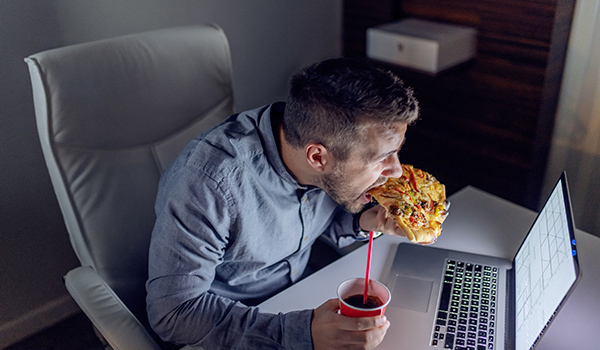
Does it really matter when you eat? At some point in your life, you’ve probably heard somebody say that eating late is bad for you. Proponents of diets like the ketogenic diet or Whole30 diet say not to eat after 6 or 7 p.m. if you want to see the benefits of the diet. But is there any truth to this? What really happens when you eat late versus eat early?
There is a lot of conflicting advice out there on this subject. In today’s post, we’ll discuss the science behind it all.
There are several studies in mice that support the idea that eating late can affect weight. In this 2017 study, researchers showed that mice lost more weight when they ate during their normal, active daily cycle versus when the group of mice was given food during their rest period.
The scientist who led this study said, “Translated into human behavior, these studies suggest that dieting will only be effective if calories are consumed during the daytime when we are awake and active. They further suggest that eating at the wrong time at night will not lead to weight loss even when dieting”.
In other studies that support the idea that late eating causes more weight gain, scientists have said eating late disturbs the circadian rhythm. A circadian rhythm is an internal 24-hour clock that most mammals, humans included, have.
If you have noticed that you feel more energized at certain times of the day versus others, you have your circadian rhythm to thank for that. The circadian rhythm is controlled by a part of your brain called the hypothalamus and is affected by several environmental factors.
One of those factors is daylight and night-time. Your brain recognizes these changes in the light outside and even the temperature and regulates your circadian rhythm accordingly.
In studies where weight loss/gain has been linked to the circadian rhythm, researchers found that when mice eat against their circadian rhythm there is increased weight gain. Or in those studies that looked at weight loss, the mice that would eat during the day lost more weight than those mice that were fed at night.
One of the explanations for this difference is that the levels of hormones in a mammal’s change depending on what time of day it is. For instance, insulin is a hormone that is high in humans in the morning. Your body uses insulin to transport sugar into the cells of your body so they can function properly.
Thus, eating a good breakfast, for instance, will be a good use of this hormonal change as your body is able to better break food down and distribute it in the mornings.
In the evenings, on the other hand, insulin is down, thanks to the circadian rhythm and some scientists suggest this as the reason why eating late may not be a good idea. For those who argue against eating late, the idea is that the food will not be broken down well and has an increased chance of being stored as fat.
The argument for eating late
The people who argue on this side usually say that the time of day you choose to eat doesn’t matter. They focus on the total caloric intake of a person and argue that as long as you’re within your maximum calories for the day, it shouldn’t matter when you eat.
The reason researchers have said this is because although there is evidence with mice that eating later on in the day and/or against the circadian rhythm causes weight gain, these studies are not repeatable in human beings.
Studies that involved human subjects show conflicting results; including the fact that eating at night does not cause some people to gain weight if they are within their maximum caloric intake for a day.
So why has eating late been linked to weight gain? Because for the people who choose to eat late, they usually eat more than they need. In any scenario, eating more calories than you need will lead to weight gain.
In this research study, researchers found that people who ate late tended to eat more calories than people who ate earlier. Thus it was not necessarily the timing of the meal but the higher caloric intake that led to weight gain.
So, does it matter if you eat late?
As you can see, this is a hotly debated topic in the nutrition research community and you’ve probably heard one version of it or the other. The answer, however, lies in the conflicting results from human studies: as human beings, we are different.
We have different life circumstances, different levels of metabolism, and even different diets. Thus, you have to find out what works best for you. If you find that you are gaining weight when you eat later even though you’re within your maximum calories for the day, it may be time to change that habit.
If you find that it doesn’t affect you at all, it may be fine for you. Ultimately, you need to find what works for you and as long as you do that alongside other healthy habits, you should maintain a healthy weight and live a healthy life.

